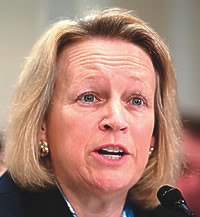SHARE:
Public Companies
Board Directors, Beware
New rules are giving activist shareholders more clout in the boardroom.
 [Christopher Sheek illustration] |
The two men share a dubious distinction. Last year, they posted among the lowest favorable vote percentages of any director standing for election at any public company based in Florida. Not coincidentally, in advance of their respective elections, both served on boards that adopted a “poison pill” provision to raise hurdles for potential acquirers, which displeased institutional investors.
Historically, the usually anonymous people who sit on the boards of publicly traded companies run without opposition and win election with rubber-stamp margins — 93% nationally in 2009, according to Proxy Governance, a Vienna, Va., service that advises pensions and other institutional investors. Directors at Florida companies in 2009 were close behind, with incumbent boards at the Florida Trend 150 largest public companies averaging 90% of the vote.
But as the 2010 proxy season approaches, change is coming. Shareholders are gaining more clout, using reports from advisory firms as leverage. Meanwhile, thanks to criticism that lax director oversight contributed to the 2008 financial crisis, the New York Stock Exchange this season for the first time has banned brokerage firms from voting on behalf of clients. Generally, 19% of the votes cast in the 2009 proxy season were cast by brokerages for shares held in street name.
 |
SEC Chairman Mary Schapiro wants to make it easier for activist shareholders to put forward an insurgent candidate slate. [Photo: AP] |
Now that the exchange has forbidden the practice in director elections, some companies will see anemic support for their directors, and activists will have an easier time winning moral victories in “vote no” campaigns against incumbent directors. (Few companies require directors to step down if they receive a low vote. Sawyer and the other Interline directors received an average of 39% approval while Lipham and his fellow directors at Syniverse averaged 44%. Directors were bounced at only two companies: At Tigrent, a Cape Coral-based company formerly known as Whitney Information Network that offers investing and entrepreneur know-how products and services, board members Frederick A. Cardin and Allan D. Weingarten left after receiving only 11% “for” votes from shareholders. They were replaced by two candidates from a slate proposed by activist shareholders. At Coral Gables-based eLandia, a majority of the board itself asked shareholders to throw out fellow director Sir James Ah Koy, who was in a legal dispute with the company.)
This month, the SEC will move toward even more drastic changes for the 2011 season to make it easier for activists to run competing slates of candidates to challenge incumbent company directors. “The new reality for public companies and their boards is a more central role for shareholders in the election process,” says Tom McAleavey, a public company and securities attorney with Holland & Knight in Orlando.
A common denominator for several companies in the Florida Trend 150 that drew weak support was a negative recommendation from proxy advisory services. The services report in detail to their institutional investor clients on a company’s corporate governance practices, financial performance, executive pay and other issues.
New York-based RiskMetrics Group, for example, recommended against Lipham and the rest of the Syniverse board for implementing a poison pill plan in 2008 without submitting it for approval to shareholders. “Apparently, organizations like RiskMetrics didn’t like this,” says Syniverse spokeswoman Diane Rose. Interline COO Ken Sweder says institutional investors objected to the company’s anti-takeover plan, but the board felt adopting it was the right choice.
RiskMetrics flags directors for “withhold” votes for a range of issues — serving on key committees while being “affiliated outsiders” rather than true independents, for approving overly generous executive compensation and perks or for poor attendance at board and committee meetings, among other things.
RiskMetrics’ recommendations don’t always hold sway, however. For Miami-based Burger King’s November 2008 meeting, RiskMetrics recommended against Sanjeev K. Mehra, a Goldman Sachs executive, for poor attendance and panned fellow Burger King director David A. Brandon for being “overboarded” — serving on more than three boards while also working as CEO of Domino’s Pizza. Mehra went on to get just 50% approval while Brandon got 97%. Burger King CEO John W. Chidsey, who had RiskMetrics’ endorsement, got tepid support from shareholders — just 69%.
 |
“The new reality for public companies and their boards is a more central role for shareholders in the election process,” says Tom McAleavey, a public company and securities attorney with Holland & Knight in Orlando. |
The question directors face is whether those with already low support are vulnerable to being ousted should activist shareholders put forward an insurgent candidate slate. SEC Chairman Mary Schapiro is pushing a rule change that will force companies to place on their ballots competing directors nominated by activists, pension and mutual funds, unions and others. Such insurgencies now must pay to create, ship and publicize their separate ballots.
Directors with low support in uncontested elections would appear to be more vulnerable, but the impact of the SEC’s proposed change will depend on who’s nominating the competition and how much they spend to back their candidacy as well as the circumstances at the company, says Scott Fenn, former senior managing director for policy at Proxy Governance.
McAleavey says if the SEC’s proposal is adopted, RiskMetrics’ influence will likely increase as shareholders turn to it to help them decide for whom to vote. Wise companies consult with large shareholders and advisory firms before making policy decisions on problematic issues to avoid negative votes and recommendations, says McAleavey. “They’re so sensitive to what those recommendations are,” he says.























